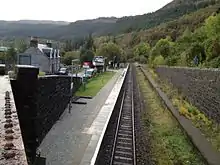Stromeferry railway station
Stromeferry railway station is a station on the Kyle of Lochalsh Line, serving the village of Stromeferry in the Highlands, northern Scotland. Stromeferry lies on the southern shore of Loch Carron, across from the ruined Strome Castle, near the west coast. It is one of five mandatory calling points on the Kyle line, along with Plockton, Strathcarron, Achnasheen and Garve.
 | |
| Location | Stromeferry, Highland Scotland |
| Coordinates | 57.3523°N 5.5509°W |
| Grid reference | NG865346 |
| Managed by | Abellio ScotRail |
| Platforms | 1 |
| Other information | |
| Station code | STF |
| History | |
| Original company | Dingwall and Skye Railway |
| Pre-grouping | Highland Railway |
| Post-grouping | LMSR |
| Key dates | |
| 19 August 1870[2] | Opened |
| Passengers | |
| 2015/16 | |
| 2016/17 | |
| 2017/18 | |
| 2018/19 | |
| 2019/20 | |
| Location | |

| |
| Notes | |
Passenger statistics from the Office of Rail and Road | |
The station is 53 miles 15 chains (85.6 km) from Dingwall, and has a single platform which is long enough for an eight-coach train.[3]
History
The station opened for passenger traffic on 19 August 1870[4]
On 3 June 1883 the station was occupied by 150 Sabbatarians, defeating the local police force and railway employees, to prevent the despatch of fish to London. They were objecting to the transport of fish on a Sunday.[5]
The station was destroyed by fire along with a train of 14 vehicles on 16 October 1891.[6]
For the first 27 years of its existence it was the line's terminus, bringing prosperity to the village. Steamer services linked to Portree on Skye, and Stornoway on Lewis. With the opening of the extension to Kyle of Lochalsh, steamer services were transferred there.
The station was host to a LMS caravan from 1935 to 1939.[7] A camping coach was positioned here by the Scottish Region from 1952 to 1967, for the last two years a Pullman camping coach was used.[8]
In the 1970s under British Rail, Stromeferry became the railhead for the Kishorn Yard. Construction material was brought in by train, then transferred by ship.
Services

Four trains each way call on weekdays/Saturdays and one each way all year on Sundays, plus a second from May to late September only.[9]
| Preceding station | Following station | |||
|---|---|---|---|---|
| Attadale | Abellio ScotRail Kyle of Lochalsh Line |
Duncraig | ||
| Historical railways | ||||
| Attadale Line and station open |
Highland Railway Kyle of Lochalsh Extension |
Duncraig Line and station open | ||
References
- Brailsford 2017, Gaelic/English Station Index.
- Butt 1995, p. 223.
- Brailsford 2017, map 22D.
- "New Railway in the North". Morning Post. British Newspaper Archive. 20 August 1870. Retrieved 15 August 2016 – via British Newspaper Archive.
- "Serious disturbance at Stromeferry". Aberdeen Journal. British Newspaper Archive. 4 June 1883. Retrieved 15 August 2016 – via British Newspaper Archive.
- "Stromeferry Railway Station Burned". Aberdeen Evening Express. British Newspaper Archive. 16 October 1891. Retrieved 15 August 2016 – via British Newspaper Archive.
- McRae 1997, p. 22.
- McRae 1998, p. 13.
- GB eNRT May 2016 Edition, Table 239
Sources
- Brailsford, Martyn, ed. (December 2017) [1987]. Railway Track Diagrams 1: Scotland & Isle of Man (6th ed.). Frome: Trackmaps. ISBN 978-0-9549866-9-8.
- Butt, R. V. J. (1995). The Directory of Railway Stations: details every public and private passenger station, halt, platform and stopping place, past and present (1st ed.). Sparkford: Patrick Stephens Ltd. ISBN 978-1-85260-508-7. OCLC 60251199.
- McRae, Andrew (1997). British Railway Camping Coach Holidays: The 1930s & British Railways (London Midland Region). Scenes from the Past: 30 (Part One). Foxline. ISBN 1-870119-48-7.
- McRae, Andrew (1998). British Railways Camping Coach Holidays: A Tour of Britain in the 1950s and 1960s. Scenes from the Past: 30 (Part Two). Foxline. ISBN 1-870119-53-3.